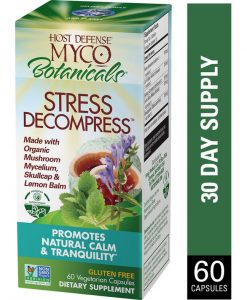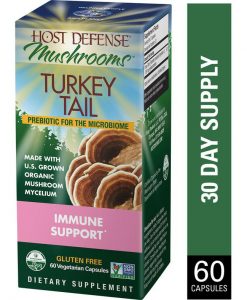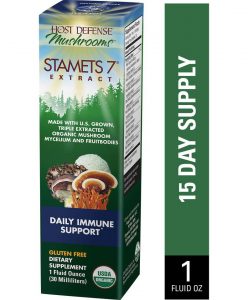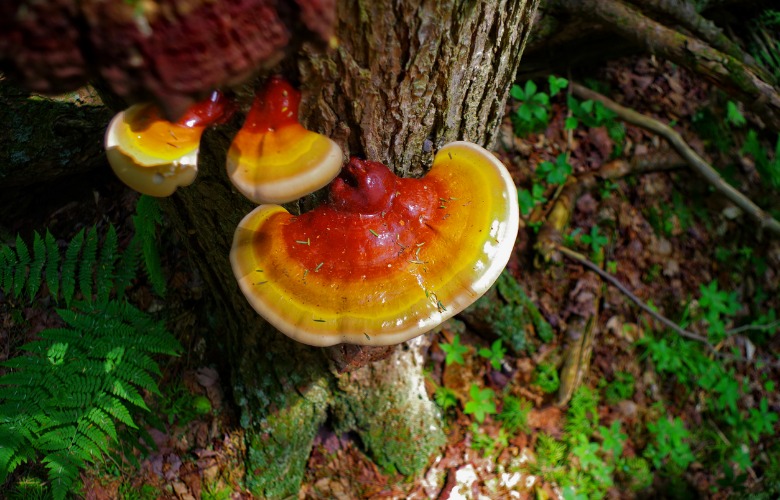Medicinal Mushrooms and Immune Support
Mushroom – An Underrated Wonder of Nature
During college, I became very interested in ecology and environmental restoration. At some point, I happened to read an article in a journal by mycologist Paul Stamets. He discussed the details of a study he participated in where specific mushroom strains were used to break down petroleum contamination in soil at a Washington state cleanup site. Not only did they successfully break down the petroleum, but it initiated a natural succession that invited birds, insects, plants and tree seedlings to take over. Fast forward a decade to 2008, when Paul Stamets gave a widely circulated Ted Talk about the many other powers of fungi, from pilot studies in integrative breast cancer treatment to natural pest control and beyond. He suggested that fungi were the ‘original internet’, so to speak, as about 90% of plant life depends on a symbiotic relationship with vast networks of mycorrhizal fungi that help them share moisture, nutrients, and even information about disease and pests.
What Are Medicinal Mushrooms?
Medicinal mushrooms is a category of edible mushrooms belonging in the family of Fungi, which have been traditional tied with health-promoting attributes. Particularly used in Traditional Chinese Medicine for many centuries, they are well regarded for contributing to one’s overall wellbeing while also treating infectious disease and supporting longevity. Ongoing research also looks into their effectiveness in treating cancer as well, with much-promising results so far. However, medicinal mushrooms, such as maitake mushroom (Grifola frondosa) are already the most commonly used natural products in Eastern Medicine when needing to fight cancer. This is also backed up with scientific research, which validates that the beta-glucans (polyssacharides in medicinal mushrooms) are found to promote antibody-Fc-interactions-related antitumor immunity via the activation of complement receptors.
That being said, the primary focus of contemporary research is on the broad immune activity of medicinal mushrooms. In fact, it has been found that species of medicinal mushrooms possess unique immunological qualities, including Turkey tail (Trametes versicolor), which can improve both the adaptive and innate immune responses.
The consumption of medicinal mushrooms with potent immunologic activity can also come with antitumoreffects due to the polysaccharopeptides found in these mushrooms. Indeed, the complex and varying polysaccharides in medicinal mushrooms are foundto stimulate immunity and host defense. That aside, medicinal mushrooms are also the source of various proteins and lectins, among other pharmacologically relevant compounds, along with sterols, phenols, and triterpenes, most of which contain powerful anti-inflammatory, anticancer, antiviral, and antioxidant activities.
Why Mycelium?
Without a saying, mushrooms are experiencing increasing popularity in the past few years, especially for use as health- and immune-supporting dietary supplements. Mushroom supplements may have compounds from different parts of the mushroom lifecycle, such as the spores, fruitbodies, or mycelium.
What is remarkable about mushrooms, which most people are not aware of is the fact that they engage in a particularly dynamic interaction with their surrounding environment. This is because their natural ecological role is to help in breaking down dead plant matter with the use of a vegetative state they contain. Mycelium is the part of the mushroom that consists of hyphae (looks like a branching thread), colonies of which are found both on and in the soil. As it grows, it secretes a wide range of compounds that change the chemical nature of its substrate, eventually leading to its degradation, which, in turn, enzymatically affects the mushroom environment by decomposing wood, and many other activities.
All these remarkable discoveries urged Fungi Perfecti, the manufacturer of Host Defense Mushrooms to join forces with Natural Immune Systems, third-party immunology experts, to further investigate the health-improving qualities of mycelium and its substrate. Their research has been published in BMC Complementary Medicine and Therapies site, where they validate the health benefits of Turkey Tail mushroom mycelium and its fermented substrate. They found that mycelium indeed carries potent immune-enhancing qualities while also providing nutritional support.
Fermented Substrate
When nutritional supplement manufacturers grow mushroom mycelium for use in their formulas, they use brown rice and other grains as a food source for mushroom mycelium, which digests the rice and gradually reduce the presence of grain. At the same time, mushroom mycelium increases its mass. During this process, the grain substrate becomes entangled in the mycelium to the point it is inseparable. The challenge lies in the fact that at production scale, it is not practical to remove what is left on the grain substrate. For that reason, manufacturers prefer to include fermented substrate in their mycelium-based mushroom formulas, which they combine with pure mycelium.
Until a while ago, some distributors of mushroom compounds claimed that one could find traces of fermented substrate in the final product, suggesting that the formula is either mainly composed of fillers or is inactive. This claim has been crushed after newly published peer-reviewed research has come to verify that fermented substrate is indeed particularly active when it comes to improving the immune function, even when separated from pure mycelium. Also, both fermented substrate and pure mycelium deliver unique health benefits, one complementing the other. Finally, mushrooms have a broad spectrum of immune-enhancing constituents besides beta-glucans.
On top of all that, immune assays performed on non-fermented-by-mycelium brown rice showed no significant immune activity. Therefore, it becomes apparent that mushroom formulas that do not contain mycelium potentially lack the full spectrum of health benefits tied to mushrooms.
The Issue With Medicinal Mushrooms
As a clinic based in Traditional Chinese Medicine and acupuncture, our practitioners are very familiar with medicinal mushrooms like reishi, shiitake, maitake, cordyceps, and others, which have been used for centuries in TCM practice. They are important tonics for immune function and essence/qi.
With the rapid commercialization of medicinal mushrooms, though, concerns about adulterated quality and contamination are legitimate. Because fungi tend to accumulate elements from where they are grown, like heavy metals and others that can’t be broken down, it is important that the growing medium or their natural habitat be untainted. At least 70% of medicinal mushrooms are supplied by China, and unfortunately weak regulations don’t guarantee uniform standards. While there are many high quality companies supplying mushrooms there, it can be difficult for consumers to separate them from the profiteers.
Medicinal Mushroom Breakthrough
Our most recent addition to the clinic, Paul Stamets’ Host Defense, addresses these concerns, and adds an even wider selection of medicinal mushroom species from around the world. Using his over 40 years of experience in mycology, Host Defense was started as part of a broader mission to research and promote the many beneficial uses of fungi and medicinal mushrooms.
In the Pacific Northwest, Host Defense cultivates dozens of species of Certified Organic mushrooms. They use a clean organic growing medium that provides optimal food for mushrooms without worry of contamination. In addition to commonly used TCM mushrooms like reishi, maitake, cordyceps, and turkey tail, Host Defense cultivates other prized mushrooms from around the globe such as agarikon, chaga, lion’s mane, mesima, agaricus, and more.
Research in medicinal mushrooms hasn’t conclusively determined whether the fruiting body (above ground) or the thin,root-like mycelia (in and on soil) are superior for medicinal use. The fruiting bodies have more historical use, but mycelia have been researched more in recent years and appear to show equal potency at lower levels. With that in mind, Host Defense utilize either one or both forms, depending on the formula, in powder, in capsule, and in liquid extract form. In addition, herbal extracts like green tea, turmeric, rhodiola, and shatavari are included in functional formulas to enhance their effectiveness. All formulas are also vegetarian, gluten-free, non-gmo, and utilize eco-friendly packaging.
About Host Defense Products
Host Defense formulas are designed to support for immunity, cognitive function, stress response, woman and man’s health, liver function and much more. One of the most researched medicinal mushrooms in recent years is turkey tail, which supports immune function and also aids the gut microbiome. Host Defense Turkey Tail has actually been used in a recent phase 1 clinical trial for integrative treatment of breast cancer.
Another formula, Stamets 7, provides broad support for the whole system with a powerful combination of agaricus, cordyceps, reishi, maitake, lion’s mane, chaga, and mesima. Stress Decompress combines mushrooms and botanicals to provide energy and combat anxiety and daily stress. The formula includes reishi, lion’s mane, skullcap, lemon balm and ashwagandha.
The Host Defense Vision
In addition to advancing the production and use of medicinal mushrooms, Paul Stamets and the Host Defense team also continues to work for a broader mission for the planet. A portion of sales goes towards protecting and preserving rare mushroom species in the Pacific Northwest, using mushrooms and fungi to protect the health of bees, developing natural pesticide alternatives, restoring soil health with mycelia, and many other projects.
 Our most recent addition to the clinic, Paul Stamets’ Host Defense, addresses these concerns, and adds an even wider selection of medicinal mushroom species from around the world. Using his over 40 years of experience in mycology, Host Defense was started as part of a broader mission to research and promote the many beneficial uses of fungi and medicinal mushrooms.
Our most recent addition to the clinic, Paul Stamets’ Host Defense, addresses these concerns, and adds an even wider selection of medicinal mushroom species from around the world. Using his over 40 years of experience in mycology, Host Defense was started as part of a broader mission to research and promote the many beneficial uses of fungi and medicinal mushrooms.
In the Pacific Northwest, Host Defense cultivates dozens of species of Certified Organic mushrooms. They use a clean organic growing medium that provides optimal food for mushrooms without worry of contamination. In addition to commonly used TCM mushrooms like reishi, maitake, cordyceps, and turkey tail, Host Defense cultivates other prized mushrooms from around the globe such as agarikon, chaga, lion’s mane, mesima, agaricus, and more.
Research in medicinal mushrooms hasn’t conclusively determined whether the fruiting body(above ground) or the thin,root-like mycelia(in and on soil) are superior for medicinal use. The fruiting bodies have more historical use, but mycelia have been researched more in recent years and appear to show equal potency at lower levels. With that in mind, Host Defense utilize either one or both forms, depending on the formula, in powder, in capsule, and in liquid extract form. In addition, herbal extracts like green tea, turmeric, rhodiola, and shatavari are included in functional formulas to enhance their effectiveness. All formulas are also vegetarian, gluten-free, non-gmo, and utilize eco-friendly packaging.
 Host Defense formulas are designed to support for immunity, cognitive function, stress response, woman and man’s health, liver function and much more. One of the most researched medicinal mushrooms in recent years is turkey tail, which supports immune function and also aids the gut microbiome. Host Defense Turkey Tail has actually been used in a recent phase 1 clinical trial for integrative treatment of breast cancer.
Host Defense formulas are designed to support for immunity, cognitive function, stress response, woman and man’s health, liver function and much more. One of the most researched medicinal mushrooms in recent years is turkey tail, which supports immune function and also aids the gut microbiome. Host Defense Turkey Tail has actually been used in a recent phase 1 clinical trial for integrative treatment of breast cancer.
 Another formula, Stamets 7, provides broad support for the whole system with a powerful combination of agaricus, cordyceps, reishi, maitake, lion’s mane, chaga, and mesima. Stress Decompress combines mushrooms and botanicals to provide energy and combat anxiety and daily stress. The formula includes reishi, lion’s mane, skullcap, lemon balm and ashwagandha.
Another formula, Stamets 7, provides broad support for the whole system with a powerful combination of agaricus, cordyceps, reishi, maitake, lion’s mane, chaga, and mesima. Stress Decompress combines mushrooms and botanicals to provide energy and combat anxiety and daily stress. The formula includes reishi, lion’s mane, skullcap, lemon balm and ashwagandha.
In addition to advancing the production and use of medicinal mushrooms, Paul Stamets and the Host Defense team also continues to work for a broader mission for the planet. A portion of sales goes towards protecting and preserving rare mushroom species in the Pacific Northwest, using mushrooms and fungi to protect the health of bees, developing natural pesticide alternatives, restoring soil health with mycelia, and many other projects.

Patrick Postlewait studied English Literature and Environmental Studies before spending the rest of his twenties working on an organic farm growing vegetables and herbs. He spent over a decade in the supplement and health food industry before becoming Brands Manager for Acupuncture Atlanta. When not at the clinic, he spends time with his wife and works as a studio musician and songwriter.



